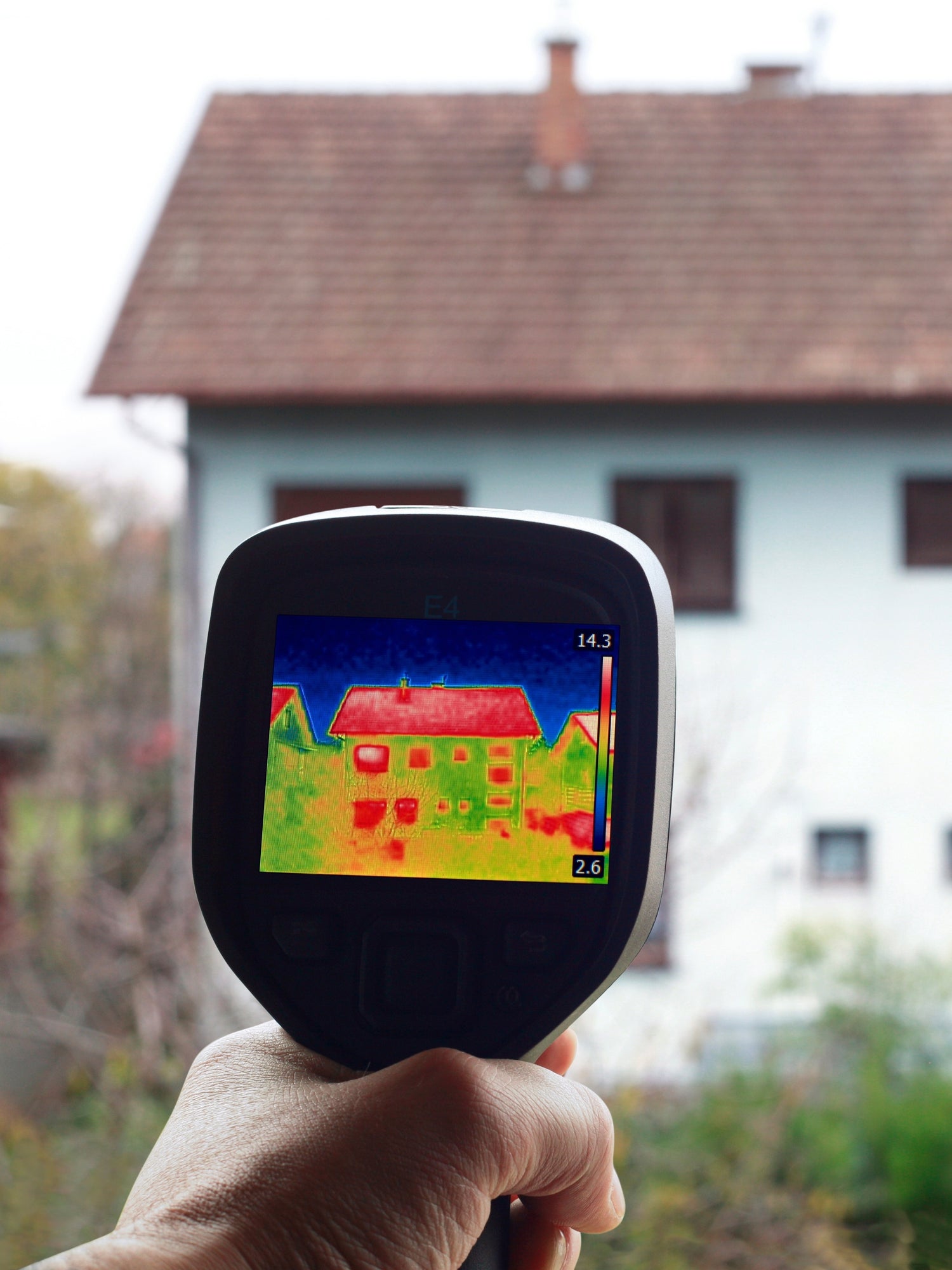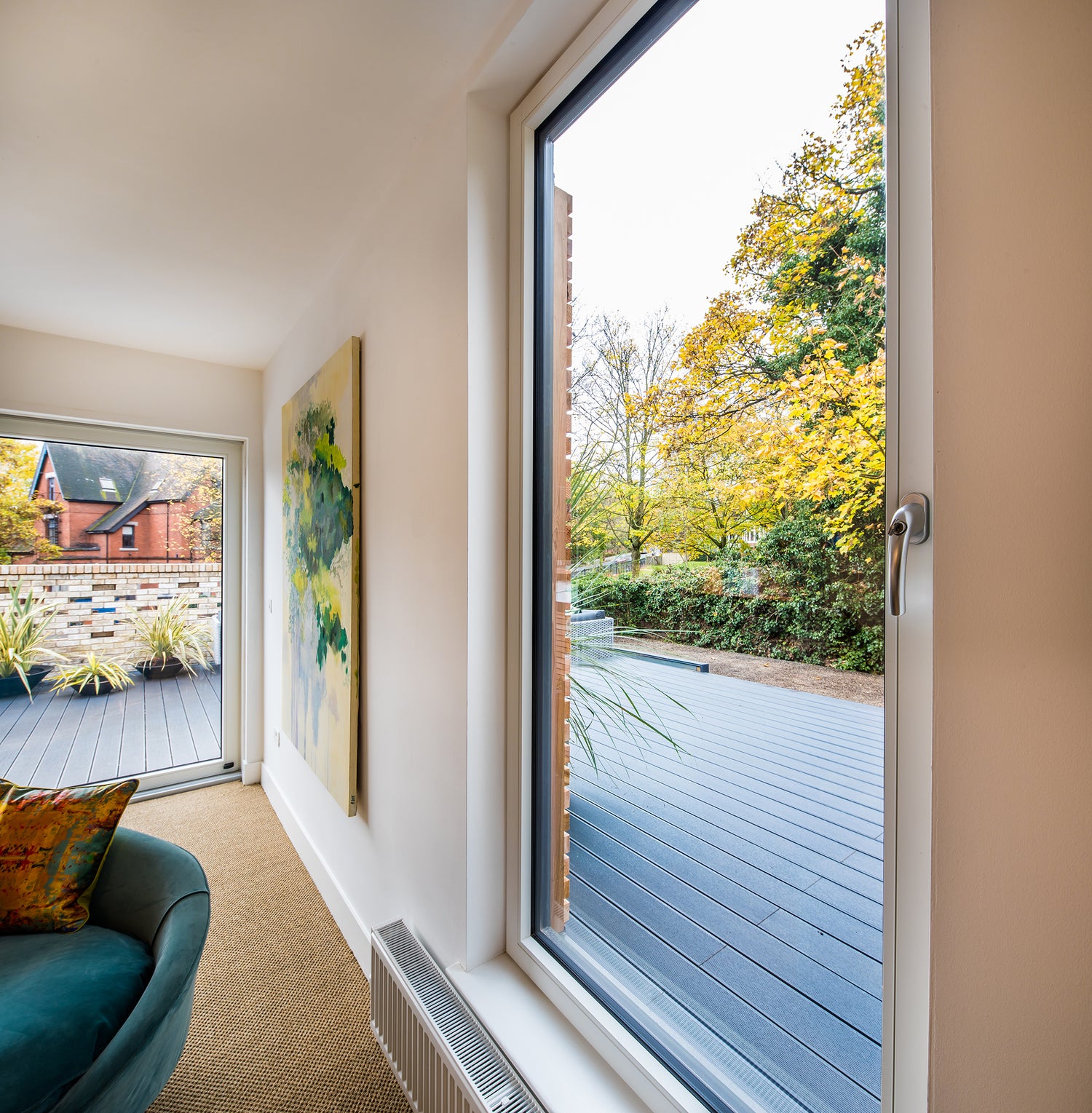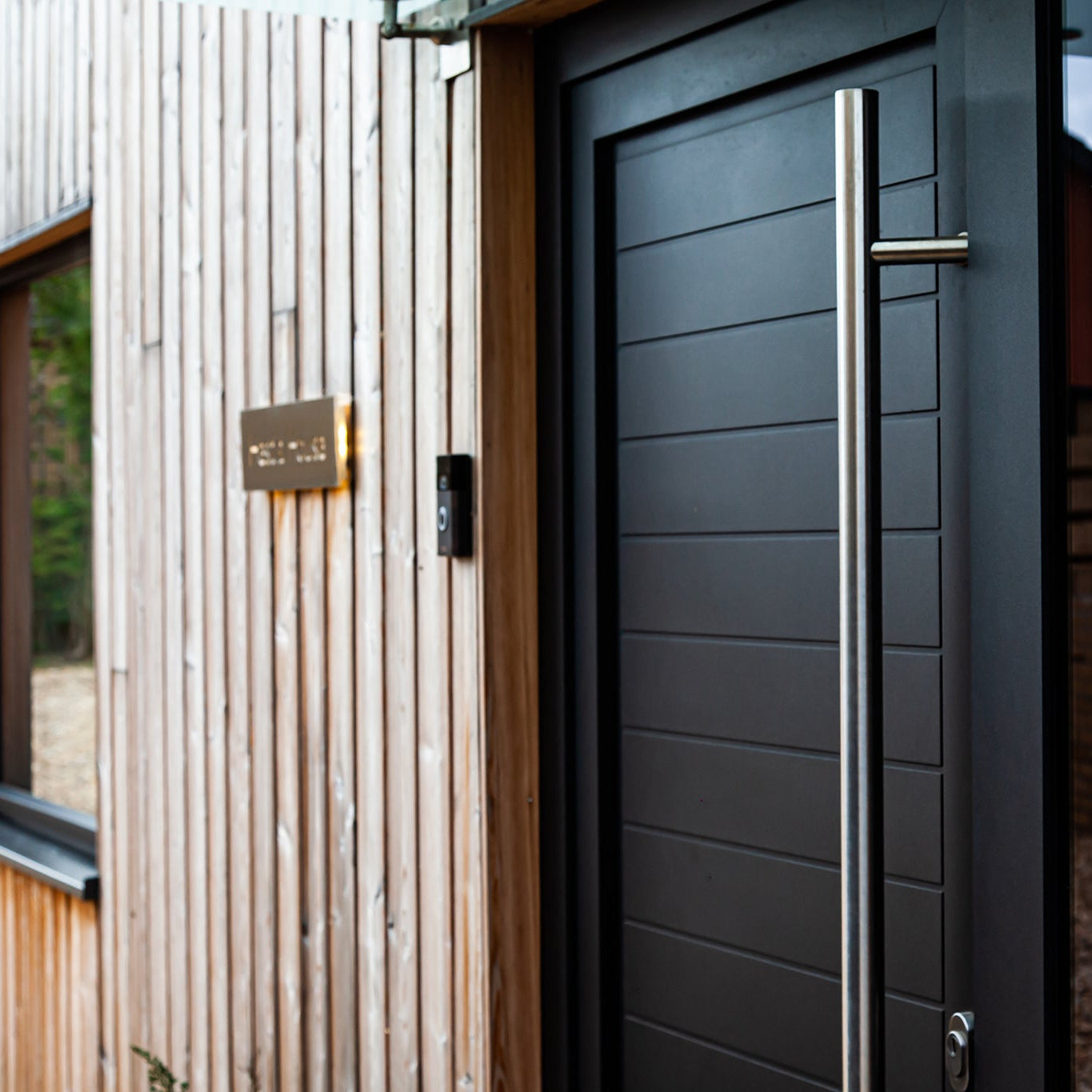
Why use triple-glazed windows & doors?
Triple-glazed windows have evolved from a Scandinavian specialty into a smart choice for UK homeowners serious about comfort, energy savings and long-term value.
The performance advantages are significant. Superior insulation creates warmer interior surfaces, dramatically reduces condensation, and delivers measurably quieter living spaces.
However, not all triple glazing delivers the same performance. Understanding what separates exceptional triple glazing from disappointment is key to choosing the perfect windows for your home.
-
Our Window Range
Premium design, precision engineering -
Our Door Range
High performance insulated entryways
How triple glazing works
Triple-glazed windows feature three panes of glass separated by two insulating cavities, typically filled with argon gas. This configuration creates two thermal barriers instead of one, substantially reducing heat transfer between your home and the outside environment.
The argon gas has lower thermal conductivity than air, while Low-E (low-emissivity) coatings on the glass reflect heat back into your home during winter. These elements combine to create an exceptionally effective insulating system that maintains comfortable indoor temperatures with minimal heating intervention.
The measurable result? Interior glass surfaces stay several degrees warmer than double-glazed windows, eliminating cold spots and condensation while maintaining comfortable room temperatures with less heating.
What are the benefits of triple glazing?
The thermal performance of a Norrsken triple-glazed window is normally 40-50% better than a double-glazed version, but typically only 10-15% more expensive.
The theoretical advantages of triple glazing translate into tangible improvements you'll experience every day:
-
Warmer Interior Glass Surfaces
No more cold spots near windows. The interior pane maintains temperatures close to room ambient, eliminating drafts and creating consistent comfort throughout your space – even on the coldest days.
-
Condensation Prevention
Because the interior glass surface stays warmer, internal condensation formation is dramatically reduced or eliminated entirely – protecting your window frames and surrounding walls from moisture damage.
-
Quieter Living Spaces
The combination of three glass panes and solid frame construction creates a substantial barrier against traffic noise, construction sounds and other external disturbances.
-
Consistent Temperatures
Less heat loss means your heating system works less to maintain comfort, creating more stable indoor temperatures and reducing the cycling of your boiler or heat pump.
Inspiration for your project
From heritage transformations to scandinavian-style passive houses, discover how Norrsken windows and doors transform exceptional homes into extraordinary spaces.
Whether it's converting industrial barns into a contemporary sanctuary or pushing the boundaries of sustainable design in passive houses, our projects span every architectural vision. See how our windows and doors brought your Norrsken neighbours' visions to life.
GALLERY
Which windows are right for you?
Take our short survey to discover the perfect windows for your project.

Background
In most houses, 20-25% of heat is lost though windows and doors.
Quality triple glazing represents a significant investment in your home's comfort, efficiency and value. Understanding what separates exceptional performance from compromise helps you make informed decisions that deliver decades of satisfaction.
The right triple-glazed windows don't just reduce energy bills – they transform how your home feels throughout the year, creating the comfortable, quiet sanctuary you deserve.
However, this still means that 75% or more of your heat is lost through walls, floors and the roof. Making these areas more efficient though better insulation and draught proofing is obviously essential to creating a low energy home and capitalising on the benefits of using high performance triple-glazed windows.
Norrsken recommends a holistic approach to the thermal envelope of your building as part of specifying your windows and doors.

Comfort
With U-values in the region of 0.8 W/m²K or better, triple-glazed windows and doors from Norrsken will lose less than half of the heat of typical double-glazed products.
Triple-glazed windows will therefore provide significantly better thermal performance than double-glazed ones.
As outlined above, this benefit is only fully realised when they are included as part of a thermally efficient whole building envelope. In other words, installing them in an unimproved, draughty and poorly insulated home will likely not be worthwhile.
On the other hand, when they are included in a well designed, well insulated home with efficient heating and - ideally - heat recovery ventilation, the benefits they bring go well beyond what simple performance numbers can tell.
On a cold day, the glass on the inside of a triple-glazed window is several degrees warmer than that on a double-glazed version.
Thermal performance visualised
Thermal models demonstrate the performance difference clearly. When external temperatures reach 0°C and internal temperatures maintain 21°C:
This temperature difference fundamentally changes how your home feels, creating spaces where you genuinely cannot tell how cold it is outside because the interior maintains such consistent, comfortable warmth.
-

Double-glazed window: The coldest section appears at the bottom of the pane, with noticeable temperature gradients across the glass surface.
-

Triple-glazed window: The internal pane temperature remains 2.5-3 degrees warmer across its entire surface compared to the double-glazed version.
The performance difference that matters
Not all triple-glazed windows are created equal. Marked differences in quality and the U-value you see can mean the gap between genuine energy savings and disappointment.
Look for solid, bespoke frames designed specifically to accommodate triple-glazed units with proper cavities between panes. Standard Norrsken triple-glazed units have 16mm gaps between glass panes, allowing for high-performance insulation and whole-window U-values as low as 0.64 W/m²K.
Whole-window U-values: the measurement that matters
-
Which U-value?
When comparing window performance, always examine whole-window U-values rather than centre-pane measurements. The distinction is crucial.
Centre pane U-values. This is the measurement of energy conductivity through the middle of a pane of glass. It is often quoted as the Ug value. Because the centre of the window pane is the most insulated part, always look for whole-window U-values, not centre-pane U-values when comparing window performance.
Centre-pane values will always appear better, but they don't reflect the real-world performance you'll experience. The frame, edges and overall construction all affect how much heat your windows retain.
Window U-values. This is the measurement of energy conductivity through the whole window, including both the glass and the frame. It is known as the Uw value.
-
Measure of heat loss
U-values are a measure of heat loss through a material and are used to measure how effective elements of a building's fabric are as insulators; that is, how effective they are at preventing heat from transmitting from the inside to the outside of a building.
U-values are measured in watts per square metre per kelvin (or Celsius) (W/(m²K)).The lower the U-value the better.
Quality triple-glazed windows should achieve whole-window U-values of 0.8 W/m²K or better to meet Passive House requirements.
Many Norrsken triple-glazed windows exceed this standard, with our best-performing systems achieving whole-window U-values as low as 0.64 W/m²K - setting industry-leading benchmarks for thermal performance.
-
Changes over time
U-values for windows and doors have similarly changed over time. A single glazed window has a U-value of around 5.0. Early double-glazed windows had a U-value of 2.5 - 3.
Current building regulations state that windows in a new build house must have a U-value of 1.2 or better - although it must be said that this is not a particularly ambitious target.
Modern double-glazed units use Low Emissivity Glass (Low-E) and argon or krypton gas in the cavity and the best double-glazed windows can achieve a U-value in the region of 1.2 W/(m²K). By contrast, many of our triple-glazed windows have a U-value of less than 0.8 W/(m²K) – 50% better than the best double-glazed windows.
Your questions answered
Have a question? You’re not alone. We’ve answered some of the most common queries about Composite Windows below.
Collapsible content

Why should I choose triple glazing?
The thermal performance of a triple-glazed window is typically 40-50% better than a double-glazed version – reducing carbon emissions and heating bills - but costs on average only 10-15% more.
The inside pane stays 2.5-3 degrees warmer over its whole surface than a double-glazed window, giving a much more comfortable feel inside the room.
Are triple-glazed windows worth it?
Triple glazing typically costs 10-15% more than double glazing but delivers 40-50% better thermal performance.
With proven payback through energy savings, most homeowners find the investment worthwhile. The benefits extend beyond energy bills – improved comfort, condensation prevention and noise reduction add significant quality-of-life value that's difficult to quantify financially.
How long do triple-glazed windows last?
There is no set lifespan for triple-glazed windows. With good care, they can last from 20 to around 50 or more years – particularly if clad externally in aluminium.
The glass in a triple-glazed window may need to be replaced sooner as its gas filling can escape over time, compromising the thermal performance of the window.
How are triple-glazed windows sustainable?
The thermal performance of our triple-glazed windows is normally 40-50% better than double-glazed equivalents.
Using our windows can contribute to a significant reduction in your home's CO2 emissions and a reduction in your heating bills. We only use FSC and PEFC certified timber and work with partner manufacturers awarded ISO 14001 qualification.
Are triple-glazed windows soundproof?
Triple glazing's benefits extend well beyond keeping your home warm. The additional glass layer creates a superior sound barrier, significantly reducing outside noise.
Originally used for safety and security, optional laminated glass also provides excellent acoustic performance by dampening sound waves.
To maximise the sound insulation properties of your triple glazing, look for solid frame construction – ideally engineered timber with optional aluminium cladding. This prevents noise ingress through the frame and seals of your windows.
Are triple-glazed windows better?
Recent research validates what Scandinavian countries have known for decades: triple glazing delivers measurable improvements in home performance.
A 2024 study published in Science and Technology for the Built Environment found that triple-glazed windows deliver "improved energy savings, comfort, and moisture resilience for thin triple windows compared to standard and high-performing double panes due to improved thermal performance, glass temperatures, and ambient air temperatures."
The research confirms that well-designed triple glazing doesn't just reduce energy costs – it fundamentally improves how comfortable your home feels throughout the year.
How much more efficient is triple glazing?
The thermal performance of a triple-glazed window is normally 40-50% better than a double-glazed version, but typically only 10-15% more expensive.
Noise reduction can also be better depending on the glass used. This improved thermal performance is delivered as a result of the extra insulation provided by the third pane of glass and the additional layer of argon gas.
What's the difference between whole-window and centre-pane U-values?
Centre-pane U-values measure only the glass performance at its most insulated point, while whole-window U-values include the frame, edges and overall construction.
Always compare whole-window U-values when evaluating windows, as centre-pane values can be misleadingly optimistic. Quality triple glazing should achieve whole-window U-values of 0.8 W/m²K or better.
Can I retrofit triple glazing into my existing window frames?
No, triple-glazed units are thicker and heavier than double glazing, requiring specifically designed frames to accommodate them properly.
Attempting to retrofit triple glazing into double-glazed frames compromises both thermal and structural performance. Proper triple glazing installation requires complete window replacement with frames engineered for the additional weight and depth.
Are triple-glazed windows right for you?
Triple glazing makes particular sense in several scenarios:
New builds and major renovations: Triple glazing should be your default
choice. The modest additional cost delivers substantial long-term value through reduced energy bills and enhanced comfort, whilst future-proofing your home against increasingly stringent energy regulations.
Passive house projects require the exceptional thermal performance –
U-values of 0.80W/m²K or less - that only quality triple glazing provides. If
you're building to Passive House standards, triple glazing isn't optional -
it's essential to achieving certification.
Heritage properties and listed buildings: The enhanced thermal performance helps meet modern energy standards whilst preserving architectural character. Slimmer sightlines in contemporary triple-glazed units mean you can achieve superior performance without compromising aesthetics.
North-facing rooms and exposed locations benefit enormously from triple
glazing's superior insulation. If your home faces harsh weather conditions or
lacks natural solar gain, the additional thermal protection becomes even more
valuable.
High performance double-glazing can provide useful alternatives to those considering triple glazing who feel it doesn’t suit their project requirements.
Making the right choice
When comparing triple-glazed windows, focus on these critical factors:
- Whole-window U-values: 1.2W/m²K or better to meet Building Regulations, 0.8 W/m²K or better to meet Passive House requirements. Most Norrsken triple-glazed windows have whole-window U-values of 0.8 or better, with our best performing window achieving 0.64 W/m²K.
- Frame construction: Solid engineered timber or aluminium-clad timber
- Low-E coatings: Multiple coatings for optimal performance
- Warranty: Comprehensive coverage indicating manufacturer confidence
The Energy Saving Trust provides additional guidance on window energy ratings and expected savings, helping you understand the long-term value of your investment.

Choose Your Windows
Find the perfect windows for your project using our advanced selector tool to filter by performance, materials, and opening styles.
Compare U-values, select timber or alu-clad frames, filter by passive house suitability, and explore opening types from fixed to tilt & turn. Our intelligent selector helps you discover windows that match your exact specifications.

Find Your Doors
Discover your ideal door solution with our comprehensive selector tool featuring performance filters and style customisation options.
Filter by thermal performance, frame materials, glazing options, and design preferences to find doors that perfectly balance aesthetics with energy efficiency. Compare specifications and explore our complete range.
Unmistakably trusted.
The highest compliment is a recommendation. These are the voices of those who placed their trust in us.
"Excellent Company from start to finish… If only every window supplier operated like this! I have used many others over the years on various projects but Norrsken far exceeded all of them… I hope this helps you make a decision for what is probably a large chunk of your budget… They are totally worth it"
Angela Smith
Self Builder
“Having used Norrsken in the past we were happy to recommend them to one of our clients who was looking for the best sound proofing and weatherproofing they could get being set on a hill top overlooking the sea and facing strong westerly winds. They were not disappointed. A quality product, delivered well and on time. Thankyou.”
Ken Pearson
Homeowner
"Fantastic professional service, from the original design to the final installation. The triple-glazed windows and doors that have been fitted to our new house are of a very high quality and look amazing. We definitely made the right choice when we decided to use Norrsken, nothing is too much trouble for them."
Nigel
Homeowner
"I did my research before contacting Norrsken but they had come highly recommended by our Architect for our Passive House self build.
From the first meeting with Nick we felt confident that they were the Company for us."
Ali and Brian Manning
Passive House Self Builders
“The quality of the triple glazed, alu-clad windows and doors is superb. They feel so reassuringly solid ... I opted for a wood stain for the internal finish on the frames, and am so glad I did, as it shows off the beauty of the wood perfectly. The whole process from order to installation went smoothly. I thoroughly recommend Norrsken.”
Gareth
Homeowner
"Norrsken provided attentive service from drawings to on-site installation for our project at National Trust Stourhead and we would definitely recommend and repeat commission them on future projects."
Charlotte Hill-Baldwin
Architect, H-B Designs
“From our very first interaction to the aftercare support, Norrsken has been exceptional. The quality of their windows is outstanding - beautifully designed, expertly crafted, and a real standout feature in our home. They've truly elevated the overall look and feel of the house.”
Neil Southwell
Self Builder Homeowner
Related resources
-

What era is your home? A quick guide to UK windows
Identify your home's “generation” and understand what typically suits it – from Elizabethan leaded lights to contemporary walls of glass.
What era is your home? A quick guide to UK windows
Identify your home's “generation” and understand what typically suits it – from Elizabethan leaded lights to contemporary walls of glass.
-

How to order Passive House windows
Guidance to make confident decisions about suppliers for your Passive House project.
How to order Passive House windows
Guidance to make confident decisions about suppliers for your Passive House project.
-

Telegraph Home of the Year
Award-winning extension features stunning Norrsken windows, earning praise in the Telegraph.
Telegraph Home of the Year
Award-winning extension features stunning Norrsken windows, earning praise in the Telegraph.
-

Norrsken Reimagined
Step into our showroom: a crafted space that brings our triple and double glazing to life.
Norrsken Reimagined
Step into our showroom: a crafted space that brings our triple and double glazing to life.
Debug: is_article_page = true
Debug: current_article_id = 998783943042
Debug: search_tags = triple-glazed
Debug: search_query =
Debug: Total articles found = 18
Debug: Post limit = 4
Debug: Posts exceed limit = true
Debug: Article 1: What era is your home? A quick guide to UK windows from
Debug: Article 2: How to order Passive House windows from
Debug: Article 3: Telegraph Home of the Year from
Debug: Article 4: Norrsken Reimagined from
Debug: Article 5: The Art of Home from












